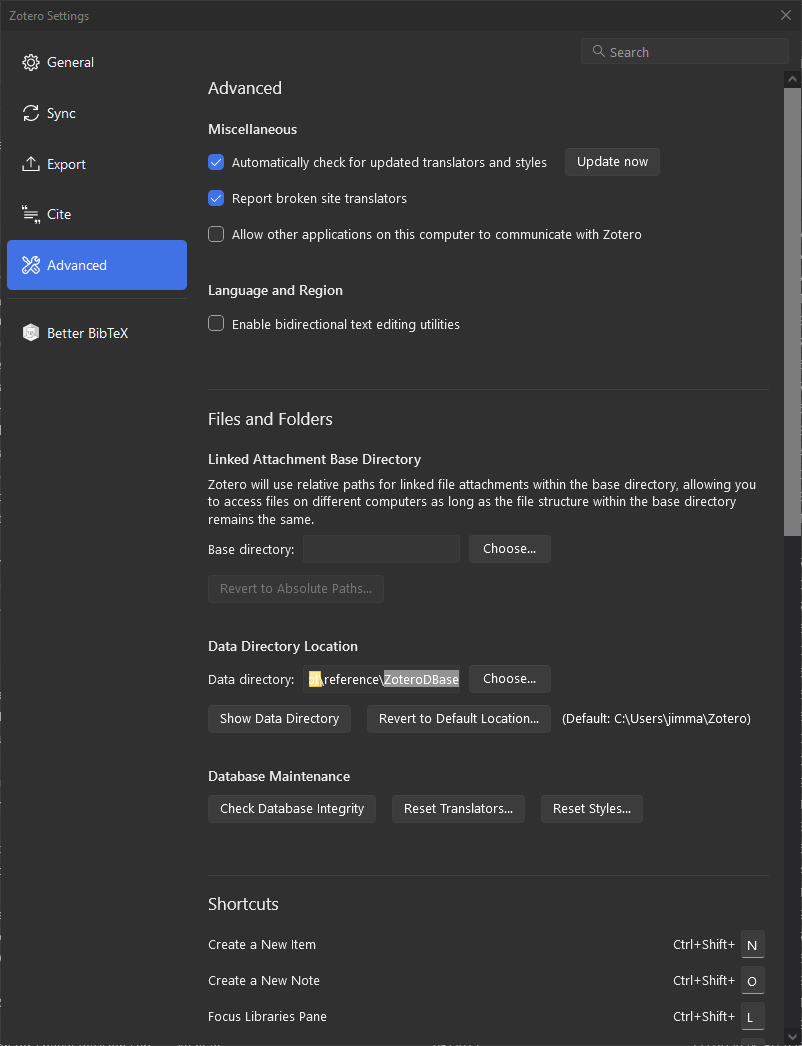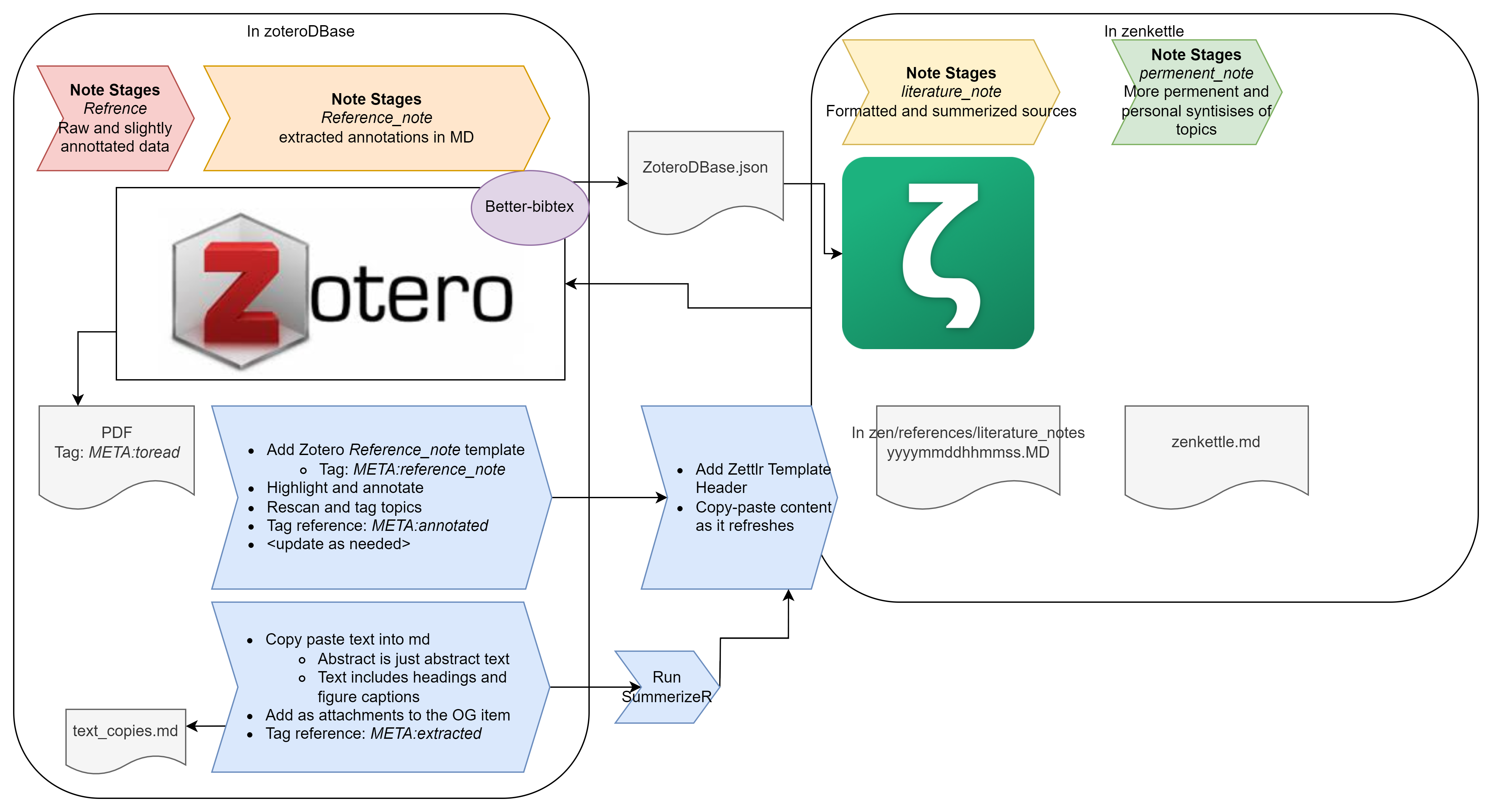Installing Zotero
Reading an academic paper is unlike reading in a traditional sense because there are a set of objectives and key pieces of information you want to be able to easily reference and re-obtain. If you ever find that you need to cite something, Zotero is the way to go about doing that. In a really tight spot, citation machine will get you by, but it really is worth investing the time to do this the right way. I install Zotero and set the location to a folder hosted on the cloud (Dropbox). Although Zotero will complain about hosing its database on the cloud, I have yet to be bitten by a corrupt database and have many times been bitten by a failing hard drive, accidental delete, or computer gremlins. As I mentioned I don’t use computers the right way, and I keep a very strange mix of notes linked through markdown using Zotero and Zettlr, loosely informed off of how both Hendrik Erz and Andy Matuschak take and form their notes and digital footprint. Despite how little it seems to have produced and how terrible I am, I’m rather fond of this pattern and documenting it keeps me more consistent. If you are only interested in using Zotero the “correct” way, download the app and browser connector, it’s solid software that just works. Otherwise, I’ve outlined how I use this to take notes as part of my data driven workflow.
Install and setup
- Download and install Zotero 7, at this point the chrome extension is probably following your Google account but if not the connector plugin as well.
- Download “Mandatory” extensions (.xpi files), which at as of Zotero 6.0.26+ only include better-bibtex for cls export.
- Direct link: https://github.com/retorquere/zotero-better-bibtex/
- Install addons in zotero by clicking tools > Add-ons and then on the gear icon on the left click Install add-on from file
- (optional) I set up the annotation export to more seamlessly mesh with my Zettlr-esque markdown layout by searching for “annotation” and change the following:
- extensions.zotero.annotations.noteTemplates.highlight :
<p><blockquote>{{highlight}}</blockquote> {{citation}} {{if tags}} - #{{tags join=' #'}}{{endif}} <br> {{comment}}</p> - extensions.zotero.annotations.noteTemplates.note :
<p>{{citation}} {{if tags}} - #{{tags join=' #'}}{{endif}} <br> {{comment}}</p>
- extensions.zotero.annotations.noteTemplates.highlight :
Tips for a more portable “remote” work setup
if I’m away for a longer trip and don’t have the comfort of my desktop to work on, one of the better ways to maintain productivity is to catch up on that reading backlog. As noted above, you can kill two birds with one stone by setting Zotero to save in a cloud location which both gives you that remote accessibility and off-site backup checks, and although it may complain about writing in the cloud I have yet to regret that decision. In Edit > Settings > Advanced, you should set your “Data Directory Location” to that folder (…/ZoteroDBase in my case). Although this doesn’t allow you to seamlessly transition between computers, it does make it pretty painless to zip, ship, unzip, read and annotate, rezip, reship, and merge without tracking individual files and with only a Zotero install on the remote end of that.

Workflow

Tags:
META:toreadMETA:annotatedMETA:reference_note
META:presentedMETA:extractedMETA:sourceMETA:abstractMETA:cleanedtext
META:reference_note
```{md}
# Reference note (literature):
## What was the question, problem or purpose of the study?
## What methods are deployed?
### What data did they use?
### What noteable codebase/tools were developed/deployed?
## What are the authors’ major findings/conclusions?
## What evidence supports their interpretations?
## Why are the findings of this research important?
## Explicit next steps they suggest
## Did I find anything surprising?
## What am I confused about?
## Interesting figures?
## Promising References
# Text annotations
# Reference note (tech):
## What was the issue they were solving
## How did they solve it
## How did I apply that to what I was doing.
## What is the teaching application this could go to?
# Reference note (random):
## What was I doing when I found this / Why did I want to save it?
## How do I think this will be applicable beyond this?
``````{md}
---
title: "<paper title>"
id:
keywords:
- Drone
- lo_q-med_q-hi_q
...
[citation]
# <paper title>
# Self Synthisis
## Extracted Abstract
# Text Summeries
## Mine
## MaxF
## TFIDF
# Annotations
```Finding documents
Google, Reference section of good papers that you read, Litmaps and an open source alternative: CitationGecko
- Once I’ve found it I’ll add it directly to Zotero (either by drag-and-drop) or by adding it with the connector. Tag all incoming papers with appropriate tags but most always the
META:toreadtag, which makes sorting your references easier.
Reading a document
- I place an empty note at the top of the document and paste the template below into that. Tag that annotation with
META:reference_note
```{md}
# Reference note (literature):
## What was the question, problem or purpose of the study?
## What methods are deployed?
### What data did they use?
### What noteable codebase/tools were developed/deployed?
## What are the authors’ major findings/conclusions?
## What evidence supports their interpretations?
## Why are the findings of this research important?
## Explicit next steps they suggest
## Did I find anything surprising?
## What am I confused about?
## Interesting figures?
## Promising References
# Text annotations
# Reference note (tech):
## What was the issue they were solving
## How did they solve it
## How did I apply that to what I was doing.
## What is the teaching application this could go to?
# Reference note (random):
## What was I doing when I found this / Why did I want to save it?
## How do I think this will be applicable beyond this?
```- Highlight and annotate the paper as I see fit, correcting the notes/extractions as best I can that first pass.
- once done, tag the annotations as I see fit.
- Right click on the file and Add Note from Annotation.
- Tag reference as
META:annotated
Auto-summerizing
While I usually prefer to do things the hard way, one of the easy ways to accelerate the process of reading a text is to clean it as you go. Using markitdown to automatically copy the text out of a PDF and into a markdown file meets two of my objectives at the same time but you still need to clean that text and so there’s still the deliberate process of ingesting and interacting with the knowledge in a document that you would otherwise skip in the comparably shallower read we perform with Natural Language Processing. Do this by…
Extracting text
- Run markitdown over the source file:
```{anaconda prompt}
set PYTHONUTF8=1 # Only need to do this once if you see an encoding error
markitdown ".\ZoteroDBase\storage\9JF26F9X\Coll and Li - 2018 - Comprehensive accuracy assessment of MODIS daily s.pdf" > .\text.md
```- For Abstract.md, keep just the text.
- For text.md, keep all headers (e.g. “1. Introduction:”) and figure titles, clean the rest up.
- Attach these to the original reference item in Zotero.
- Tag the reference with:
META:extracted. - Tag the PDF with
META:source. - Run SummerizeR over those files, and copy-paste the outputs into the literature note.
Adding that to my literature notes
- Create a new file in the literature_notes section and add the template header.
```{md}
---
title: "<paper title>"
id:
keywords:
- Drone
- lo_q-med_q-hi_q
...
[citation]
# Summary
## Mine
## MaxF
## TFIDF
# Annotations
```- Copy-paste the relevant details and annotation into the “literature_notes” folder
From Brian Lagotte:
- Isolate relevant passages from the literature relevant to your research.
- collecting passages that strike us as interesting and related
- Consolidate relevant passages from the literature relevant to your research.
- discarding passages that are suddenly not so relevant
- making source files
- Integrate relevant passages from the literature relevant to your research.
- synthesizing passages that reveal something interesting for you
- creating paragraph outlines to see which ones make the paper
- discover your throughline
Accreting that into knowledge
Moving from literature notes to more concrete and meaningful output is more elaborately explained in my workflow outline.